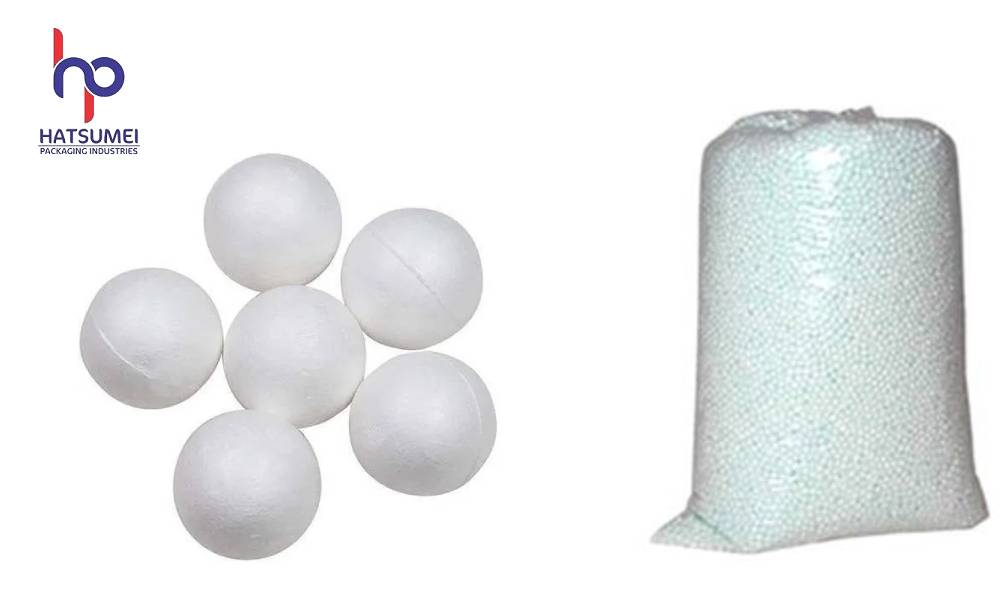
Thermocol Balls and Beans Supplier from Ghaziabad: A Comprehensive Guide
Thermocol balls and beans, manufactured from expanded polystyrene (EPS), are lighter, durable, and versatile in application in an array of industries. Their shock-absorbing ability, insulation, and environmental friendliness have made thermocol an integral trading input in many applications. Ghaziabad, an industrial zone near Delhi, has risen to the occasion as an important supplier of thermocol balls and beans responding to businesses with increasing demand across India. This blog will discuss what thermocol balls and beans are, how they are made, where they find use in different industry segments, and why Ghaziabad is the best place to source them.
What Are Thermocol Balls And Beans?
Thermocol balls and beans are made of expanded polystyrene, a lightweight and durable material. Polystyrene beads are subjected to quite a bit of heat and pressure, allowing them to expand and mold into tiny, round-shaped particles, commonly referred to as balls or beans. These small bits of thermocol are light, cheap, and highly versatile, which, in turn, maximizes their applications in various industries, such as packaging, construction, insulation, and even crafts.
Polystyrene is a type of plastic with closed-cell structure, making it a good insulator and moisture-resistant. The balls and beans made of these materials are also buoyant; they can float in water, lending them, therefore, in applications like flotation devices and other water-related uses.
Uses of Thermocol Balls and Beans
Due to the distinctive properties of thermocol balls and beans, they are widely used in various industries. Here are some of their most common applications:
1. Packaging Industry
Thermocol balls and beans are extensively used for packaging. They are most often used as a cushion for handling fragile cargo while on transit. Being lightweight, thermocol balls and beans fill the voids in boxes to absorb shocks and protect items such as glassware, electronics, ceramics, etc. All these thermocol materials are the cheapest and most efficient way of ensuring that products reach their prescribed destination safely.
Food items such as fruits, vegetables, and frozen products are also popularly packaged using thermocol balls. The moisture-resistant property of thermocol ensures that these products remain dry and fresh during transit, thus lowering the risk of spoilage.
2. Construction and Insulation
Thermocol balls and beans are usually used in the construction industry for insulation purposes. Due to their thermal resistance and low thermal conductivity, thermocol materials maintain temperature control inside buildings, keeping the interiors cool during hot weather and warm in colder conditions. They are used in walls, roofs, and floors to prevent heat loss or gain.
Thermocol beans can also be added in cement in order to obtain a lightweight concrete mixture used for flooring or other applications related to construction. Such lightweight concrete is fit for scenarios requiring reduced weight without compromising strength and durability of the building materials used.
3. The Craft and Decoration]
Thermocol balls and beans are materials very much in demand for craftwork and decoration. They are easily cut, shaped, and painted, making them a choice for artists, decorators, and DIYers alike. These materials are used for building sculptures, models, and festive decoration. Their versatility means they can be applied in costume design, with props and large setups for events.
4. Agricultural Applications
In agriculture, small thermocol balls can be used in hydroponics and aquaponics systems. It is a type of growing medium for plants in water-based growing systems. These systems require an inert medium that will not degrade and will not absorb water, and thermocol balls are good for that. They also help maintain proper drainage and aeration of rooting for plants in water-based agriculture.
5. Sports and Leisure
Thermocol balls are also widely being used in the sports and leisure industry, especially within flotation devices, helmets, padding, and within various other protective equipment. The buoyancy property of thermocol makes it an ideal material for various trade applications which require lightness and water resistance.
6. Environmental Uses
Since thermocol is rather too buoyant, thermocol balls have been applied to clean up the oil spills. The balls, being small in size and having such structures, are able to absorb oil and other liquids profusely and hence serve as a godsend for the environment when it is time to control and mitigate disasters.
The Manufacturing Process of Thermocol Balls and Beans
The manufacturing of thermocol balls and beans consists of a process known as "expansion." This process enables the transformation of polystyrene beads into lightweight and durable materials and hence finds multiple applications. Here is a stepwise outline of the production process:
1. Production of Polystyrene Beads
The manufacturing process begins with the production of polystyrene beads which come into being through a polymerization process. During polymerization, styrene molecules are chemically bonded to other styrene molecules in long chains giving a solid polystyrene. These beads form the raw material required to produce thermocol balls and beans.
2. Beads Pre-Expanding
The subsequent step is to pre-expand the polystyrene beads. These beads are heated in steam chambers, and thus undergo rather considerable expansion. The beads expand up to 40-fold and are converted into light loose balls or beans. The steam helps in creating small air pockets within them, rendering them unique-insulating property.
3. Molding and Shape
During this time, the thermocol beads are placed in molds according to the profiles of particular shapes and sizes post pre-expansion. The beads receive further heating, causing them to fuse with one another. This guarantees uniformity of density and size to the thermocol balls and beans. Moreover, it is during this stage that the manufacturers can choose to customize the size and shape of the balls or beans.
4. Cooling and Cutting
Once the thermocol beads are molded into the desired shapes, they are cooled and solidified. The final cut or shape of thermocol balls and beans is then done to the buyer's needs. After the final cooling process, they are ready for shipment and distribution.
5. Quality Control
Quality control checks are made at each step of the manufacturing process to ensure adherence to the standard quality of the thermocol balls and beans. The checks include density, size, and general quality assessment of the material. Only the best products will eventually be packaged and shipped to customers.
Why Is Ghaziabad One of the Leading Suppliers of Thermocol Balls and Beans?
Indeed, Ghaziabad in Uttar Pradesh is fast emerging as a manufacturing hub for thermocol products such as balls and beans because of several factors that make it sweet in the mouth of manufacturers:
1. Strategic Location
Proximity to Delhi-the national capital of India-makes Ghaziabad easily accessible from the largest market in the country. Of its own, Ghaziabad is connected well by road, rail, and air. Thus it becomes one of the ideal production and distribution areas. Makers are quite free to a certain point in the reach of their products across India.
2. Raw Material Availability
Several research-based chemical and polymer industries within the Ghaziabad area keep the casual supply of the raw materials needed to produce thermocol. Furthermore, an adequate supply of polystyrene beads, the basic components to manufacture thermocol balls and beans, assures that production will continue without interruption.
3. Skilled Workforce
Ghaziabad sits on the talent pool of a very experienced workforce. Such a skilled set of labor will have great importance in continuously maintaining and uplifting production standards while keeping the thermocol balls and beans precise and high-quality finished products.
4. Robust Infrastructure
The city has the best kind of infrastructure from industrial zones and manufacturing parks, further stimulating the mass production process. It ensures efficient manufacture and waste-free distribution of thermocol products within all parts of India.
Conclusion
Thermocol balls and beans are useful materials versatile in different industries, namely packaging, construction, insulation, crafts, and environmental applications. Ghaziabad has therefore become a key player in the production and supply of these materials, thanks to its strategic location, skilled workforce, and robust infrastructure. With the growing demand for these products, Ghaziabad has always been at the forefront as the best supplier of high-quality thermocol balls and beans. Manufacturers like Hatsumei Packaging Industries are also delivering such innovative materials in satisfying demands across different industries.


